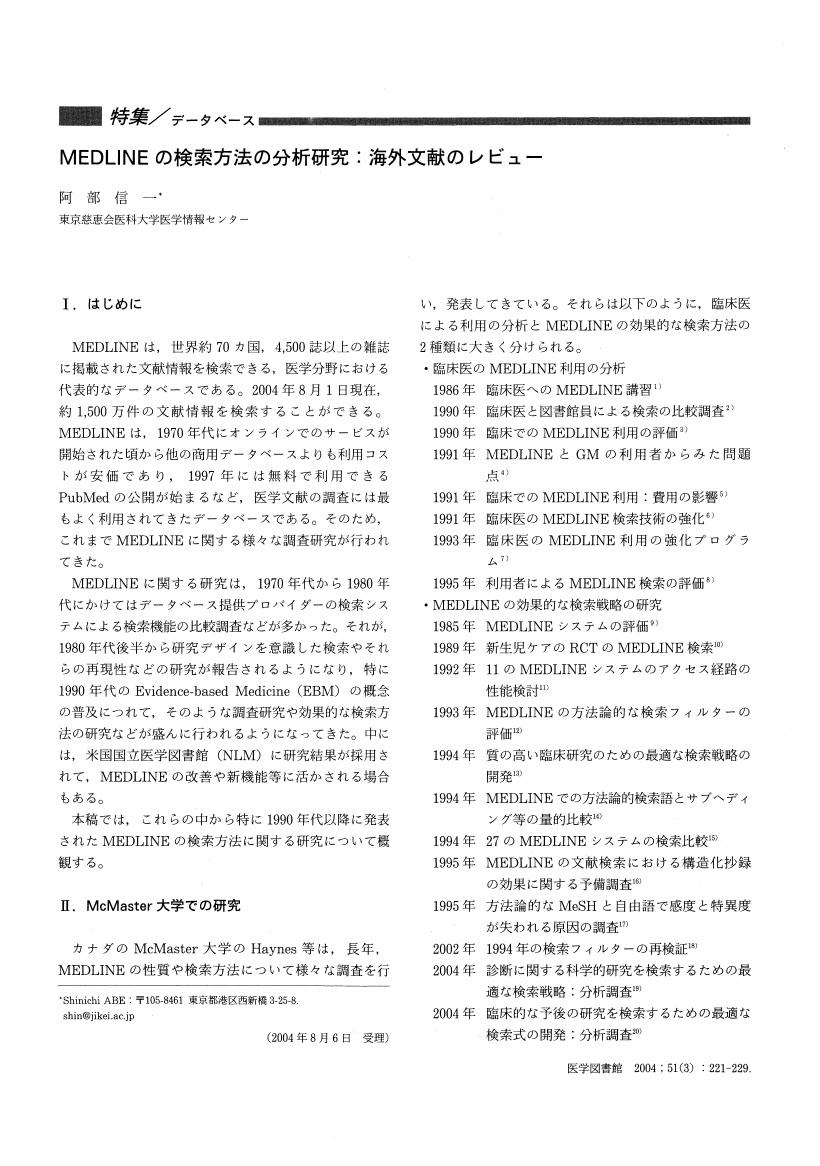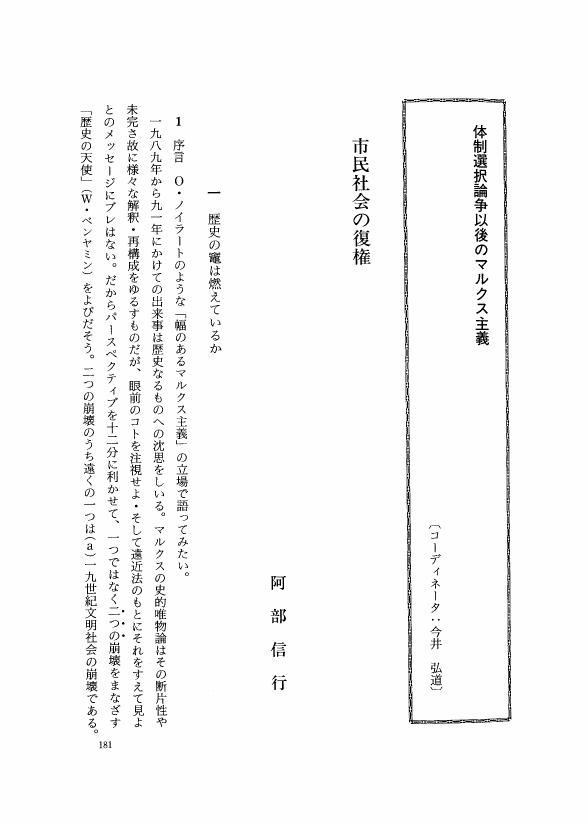35 0 0 0 OA Q & A
- 著者
- 阿部 信一
- 出版者
- The Japan Medical Library Association
- 雑誌
- 医学図書館 (ISSN:04452429)
- 巻号頁・発行日
- vol.51, no.4, pp.387-388, 2004-12-20 (Released:2011-09-21)
- 参考文献数
- 3
12 0 0 0 OA 海軍読本
- 著者
- 阿部信夫 著
- 出版者
- 海軍省海軍軍事普及部
- 巻号頁・発行日
- vol.第20号, 1939
3 0 0 0 OA 演説:大命を拝して(上)
- 著者
- 阿部 信行[総理陸軍大将]
- 出版者
- コロムビア(戦前)
- 巻号頁・発行日
- 1939-10
3 0 0 0 IR 亀本洋『法哲学』 (成文堂 2011;627頁+viii):書評
- 著者
- 阿部 信行
- 出版者
- 白鴎大学法学部
- 雑誌
- 白鴎法學 = Hakuoh hougaku : Hakuoh review of law and politics (ISSN:13488473)
- 巻号頁・発行日
- vol.19, no.2, pp.40-28, 2012-12-01
- 著者
- 阿部 信一
- 出版者
- 病院図書室研究会
- 雑誌
- ほすぴたるらいぶらりあん (ISSN:02884496)
- 巻号頁・発行日
- vol.27, no.4, pp.367-376, 2002-12
- 被引用文献数
- 1
2 0 0 0 OA 癌化学療法時の口腔粘膜障害予防を目的としたメシル酸カモスタットトローチ剤の開発
- 著者
- 郡 修徳 小澤 武史 高崎 雅彦 江口 久恵 三輪 興三 沼 潤幸 阿部 信
- 出版者
- 公益社団法人 日本薬剤学会
- 雑誌
- 薬剤学 (ISSN:03727629)
- 巻号頁・発行日
- vol.61, no.1, pp.34-45, 2001 (Released:2019-05-18)
- 参考文献数
- 19
We prepared a troche containing camostat mesilate for the prevention of the mucositis in the mouth induced by cancer chemotherapy. The troche was formed by the direct compression of a powder mixture of camostat mesilate, a flavoring agent, hydroxypropylcellulose, and magnesium stearate. A troche containing 10% or 20% hydroxypropylcellulose and a flavoring agent of coffee or green apple diminished the bitterness of camostat mesilate. It was found that the metabolising rate of camostat in saliva was much slower than that in blood, although metabolites in saliva were the same kinds as those in blood. The amounts of camostat retained in the mouth after administration of the troche to healthy subjects were much larger than those after applying a gargle which had a bitter taste. Moreover, the troche containing the flavoring agent of green apple showed smaller amounts of camostat and its metabolites retained in the mouth compared to the troche containing the flavoring agent of coffee. It is considered that the increase in the secreting volume of saliva after administration of the troche containing the flavoring agent of green apple would prevent the retaining of camostat and its metabolites in the mouth. Moreover, the administration of a troche is more convenient than that of a gargle for patients. The troche prepared in this study would be a substitute dosage form for the gargle and promote the quality of life in patients.
2 0 0 0 OA 長野県浦野川における魚類の種組成と食物関係
- 著者
- 片野 修 中村 智幸 山本 祥一郎 阿部 信一郎
- 出版者
- 公益社団法人 日本水産学会
- 雑誌
- 日本水産学会誌 (ISSN:00215392)
- 巻号頁・発行日
- vol.70, no.6, pp.902-909, 2004 (Released:2005-07-08)
- 参考文献数
- 25
- 被引用文献数
- 8 9
浦野川において魚類の種組成, 個体密度, 成長率および食物関係について調査した。合計で14種, 7,052個体の魚類が採集された。オイカワがもっとも優占し40%以上の個体数を占め, ついでドジョウ, ウグイ, カマツカが多かった。これらの魚種は6月から8月にかけて正の成長を示した。大半の魚はユスリカなどの水生昆虫を捕食していたが, オイカワだけは底生藻類を主食としていた。浦野川の調査区においてはナマズなどの魚食性魚類がほとんど生息しておらず, その生態的地位が空白となっている。したがって, オオクチバスなどの外来魚食魚の侵入が危惧される。
価値多元社会における多面的多角的見方を育成する経済教育カリキュラムの開発研究である。研究を進める上で、「カリキュラム班」と「金融リテラシー班」の二つに分けた。カリキュラム班では、「価値多元社会における多面的多角的見方」の原理研究と海外のカリキュラム調査を試みた。金融リテラシー班は、中学生の金融リテラシー調査結果をもとに、経済的見方の有無にかかわらず一定の経済知識はあることが明確となった。カリキュラム班で明らかにした多面的多角的見方育成の原理と、リテラシー調査班で明らかにした中学生の現状の一端を説明する。前者に関しては、第一に、多面的多角的見方育成のための原理として、(1)一元的な経済学教授から多元的な経済学教授へ、(2)政策決定学習などでの経済論争を基礎とした既得観念との差異を対象化する学習、(3)経済学の合意・不合意を前提としたカリキュラム教材の構成を、(4)行動経済学などの成果を基にした感情などを踏まえた意思決定モデルの精緻化を提起した。また、カリキュラム教材としては、米国では、問題基盤経済学、経済学の倫理的基礎付け教授などのカリキュラム教材によって、英国からはビジネス教育のカリキュラム教材にそのモデルを見いだした。後者のリテラシー班では、稀少性などの経済基本概念がきわめて弱く、福利などの知識が弱かった。財の種類、収益が高い貯蓄商品、複利計算、株と債券の違い、投資家の収益(配当)、分散投資などは、米国に比しても高く、半数以上は把握していた。日米の差異は、文化的背景も考えられるが、カリキュラムや教材を含め、多面的内容構成に課題を投げかけている。
1 0 0 0 OA 学会発表における審査 国内医学分野でのアンケート調査
- 著者
- 山口 直比古 阿部 信一 雨宮 正恵 大村 伸栄 多胡 英樹 廣田 住友
- 出版者
- 日本医学教育学会
- 雑誌
- 医学教育 (ISSN:03869644)
- 巻号頁・発行日
- vol.21, no.6, pp.387-394, 1990-12-25 (Released:2011-08-11)
- 参考文献数
- 9
In Japan, more than 1, 200 medically-oriented meetings are held each year, with the number of presentations given at those meetings estimated at over 100, 000.A questionnaire was sent to the member societies of the Japanese Association of Medical Sciences in order to obtain information about the character and the role of the meeting abstract. Moreover, Another questionnaire was sent to individual doctors and researchers regarding their views of the abstract selection process. It was found that 65 percent of the meetings held by the member societies, especially large-scale and clinicallyoriented societies, have a referee system. However, submitted abstracts are rarely rejected (average 9 percent), and only the subject matter is supposed to be checked. Moreover, it was clear that most doctors and researchers recognize the necessity of a refereeusystem for national meetings of general interest where they present their research achievements, and think research meetings where a small group of specialists gather to discuss a certain subject have less need for a referee system.Through the use of these two questionnaires, two main concepts were obtained:(1) a referee system is necessary to maintain high-level meetings, and (2) all applicants should be given an opportunity to present thier papers.
1 0 0 0 OA MEDLINE の検索方法の分析研究 海外文献のレビュー
- 著者
- 阿部 信一
- 出版者
- 特定非営利活動法人 日本医学図書館協会
- 雑誌
- 医学図書館 (ISSN:04452429)
- 巻号頁・発行日
- vol.51, no.3, pp.221-229, 2004-09-20 (Released:2011-09-21)
- 参考文献数
- 48
1 0 0 0 OA 亀本洋『法哲学』 (成文堂 2011;627頁+viii):書評
- 著者
- 阿部 信行
- 雑誌
- 白鴎法學 = Hakuoh hougaku : Hakuoh review of law and politics (ISSN:13488473)
- 巻号頁・発行日
- vol.19, no.2, pp.40-28, 2012-12-01
1 0 0 0 OA フェムト秒レーザーによる表面微細構造形成
- 著者
- 加藤 貴行 阿部 信行
- 出版者
- 一般社団法人 表面技術協会
- 雑誌
- 表面技術 (ISSN:09151869)
- 巻号頁・発行日
- vol.60, no.11, pp.716, 2009-11-01 (Released:2010-05-28)
- 参考文献数
- 12
- 被引用文献数
- 1 1
1 0 0 0 OA Landsat TMデータを用いた落葉広葉樹天然林における葉面積指数の推定
- 著者
- 星 直弥 龍原 哲 阿部 信行
- 出版者
- 一般社団法人日本森林学会
- 雑誌
- 日本林學會誌 (ISSN:0021485X)
- 巻号頁・発行日
- vol.83, no.4, pp.315-321, 2001-11-16
- 被引用文献数
- 3
本研究ではLandsat-5 TMデータを用いて落葉広葉樹天然林における葉面積指数(LAI)の推定を試みた。新潟県滝首湿原流域, 日尊の倉山流域で落葉広葉樹天然林のLAIをリタートラップ法により測定した。LAIの実測値とLandsat-5 TMデータから得られる各バンドの輝度値, タッセルドキャップの概念のBrightness, Wetness, Greenness, 正規化植生指数(NDVI), 比植生指数(RVI)との関係を調べた結果, NDVIと最も高い相関を示した。指数式でLAIとNDVIとの関係を示した結果, 標準誤差率は6.6%であった。さらに, LAIと葉乾重量の一次回帰式を求めた。二つの式を用いてNDVIから推定した葉乾重量と実測値との相関係数は0.576,有意水準1%で有意であった。LAI-NDVI関係式を適用して, 研究対象地におけるLAI分布図を作成した。LAIの平均値は滝首湿原流域で4.15,日尊の倉山流域で5.00であった。
1 0 0 0 OA レーザ照射による酸化チタン皮膜の表面形態変化
- 著者
- 吉岡 卓 塚本 雅裕 中野 人志 吉田 実 高橋 雅也 藤田 雅之 阿部 信行
- 出版者
- 一般社団法人 溶接学会
- 雑誌
- 溶接学会全国大会講演概要 平成20年度春季全国大会
- 巻号頁・発行日
- pp.63, 2008 (Released:2008-04-18)
エアロゾルビームプロセッシングにより酸化チタン皮膜を形成し、皮膜表面に高強度短パルスレーザを照射した。照射部を観察した結果、アブレーションせずに形態が変化している事が分かった。続いて、照射部にCWレーザを照射した。その結果、更に形態を変化させる事に成功した。
1 0 0 0 OA 市民社会の復権
- 著者
- 阿部 信行
- 出版者
- 日本法哲学会
- 雑誌
- 法哲学年報 (ISSN:03872890)
- 巻号頁・発行日
- vol.1997, pp.181-208, 1998-10-30 (Released:2009-02-12)
- 参考文献数
- 4
1 0 0 0 OA 「法的討議の社会理論」への道程-アレクシーの近著『法の概念と妥当』(一九九二)を読む
- 著者
- 阿部 信行
- 出版者
- 日本法哲学会
- 雑誌
- 法哲学年報 (ISSN:03872890)
- 巻号頁・発行日
- vol.1995, pp.185-193, 1996-10-30 (Released:2008-11-17)
- 参考文献数
- 6
1 0 0 0 山陰から九州北方沖日本海の第四紀断層とネオテクトニクス
- 著者
- 岡村 行信 井上 卓彦 阿部 信太郎
- 出版者
- 一般社団法人 日本地質学会
- 雑誌
- 日本地質学会学術大会講演要旨 (ISSN:13483935)
- 巻号頁・発行日
- vol.2014, 2014






